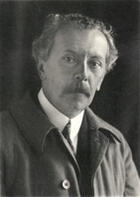
Miklós Bánffy (1873-1950), Count of Losoncz, was born in Kolozsvár, Hungary (now Cluj-Napoca, Romania) and belonged to one of the most important aristocratic dynasties in Transylvania. Noble, politician, diplomat and novelist, he also stood out for his contribution to the arts as a musician, painter, playwright and set designer.
He held different political positions, the most important being Minister of Foreign Affairs of Hungary, a position from which he tried to reduce the effects of the Treaty of Trianon (1920), by which Hungary lost two thirds of its territory; among others, the region of Transylvania in which Bánffy was born and which passed under Romanian sovereignty. A few years later Bánffy retired from politics and settled in his Transylvanian properties, from where he began a series of activities to promote the Hungarian language and culture in Romanian territory. His masterpiece, the Transylvanian Trilogy, composed of the novels The Numbered Days (1934), The Judged Souls (1937) and The Divided Kingdom (1940), constitutes an impressive fresco of Hungarian society and politics immediately before the first war. world. He is also the author of plays, stories and two books of memoirs: Desde mi memoria (1932) and Veinticinco años (1945). After the Second World War, Bánffy remained in Romania until 1947 when he managed to leave the country and travel to Hungary to join his family. The banning of his books by the communist regimes of Hungary and Romania prevented the dissemination of his work and his books disappeared until their reissue was finally allowed in the 1980s. In recent years, after the publication of the English version of The Counted Days, translated by the author's daughter, global recognition finally begins for one of the greatest novels of Hungarian literature of the 20th century.




